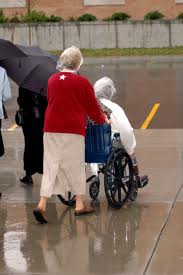 I get asked a lot of times what we do as geriatric care managers, and you can go to our national association’s web site (caremanger.org) for their answer. But since we most often get called in to address a life crisis or other life-changing event in the life of an older loved one, I thought it would be helpful to offer what it looks like in action to be a geriatric care manager (a GCM) when the call comes in.
I get asked a lot of times what we do as geriatric care managers, and you can go to our national association’s web site (caremanger.org) for their answer. But since we most often get called in to address a life crisis or other life-changing event in the life of an older loved one, I thought it would be helpful to offer what it looks like in action to be a geriatric care manager (a GCM) when the call comes in.
As a GCM, what we do best is assess a situation, make a plan and then assist in executing the plan. Most of the caregiver calls we get, however, leave very little time to assess and plan, because it is a family emergency when our phone rings. Mom or dad has fallen with a resulting hip fracture or mom or dad has had a stroke or a heart attack or some other medical emergency. A geriatric care manager is not the first responder, but we are the second responders who help the older loved one’s support system find their options and recover some sense of normalcy. Sometimes it becomes a new normal, because life has changed for everyone.
Caregivers may not realize how “normal” has changed so instantly at first, because the hospital providers have done a remarkable job of stabilizing the patient and averting a life-ending disaster. And even the course of the hospital trajectory seems normalizing. A discharge planner comes to the older loved one’s room and explains how home health will be prescribed or how physical therapy will be ordered and the road to recovery seems pretty clear.
At this point, please do not mistake what I am saying for a criticism of hospital discharge planning, but look closely at what they call the process. They do not call it normalizing planning, they do not call it the new normal planning, they do not call it life planning; they call it discharge planning. Their major focus is on getting the patient safely out of the hospital and into the next level of care – it may be a rehab center in the case of a broken hip or a nursing home in other cases or home with a provider coming to them for their care. But who is looking to help create a plan for regaining and optimizing quality of life? Who is there to help make home a safe place for an older loved one with some new physical or health deficits that were not there before?
I have just given the job description for a geriatric care manager. GCMs are the people who help make home safer…or if not home, then help to offer the options for a safe place for your older loved one. We are the people who help to find and coordinate the services or physical assists for a person whose life-changing event will not allow life to go back to what it once was. As I tell our clients, we are the option-makers for the decision-makers, and “quality of life” is our goal not just for the older loved one, but for all the caregivers as well.
We also are the voice of the caregiver and the older loved one. We are the advocates who will speak up when a referral is not to the appropriate medical specialist or when something in the medical record does not make sense. One of my clients once observed that we “translate medical speak” for the family. And we even go one beyond that by asking questions not every lay person would think to ask. We also recognize what a tough path an older loved one’s care trajectory can be for the caregiver. We are there to help care for the caregiver as much as for the older loved for whom they called us in the first place.
Charlotte Bishop is a Geriatric Care Manager and founder of Creative Care Management, certified professionals who are geriatric advocates, resources, counselors and friends to older adults and their families in metropolitan Chicago. Please email your questions to info@creativecaremanagement.com.





